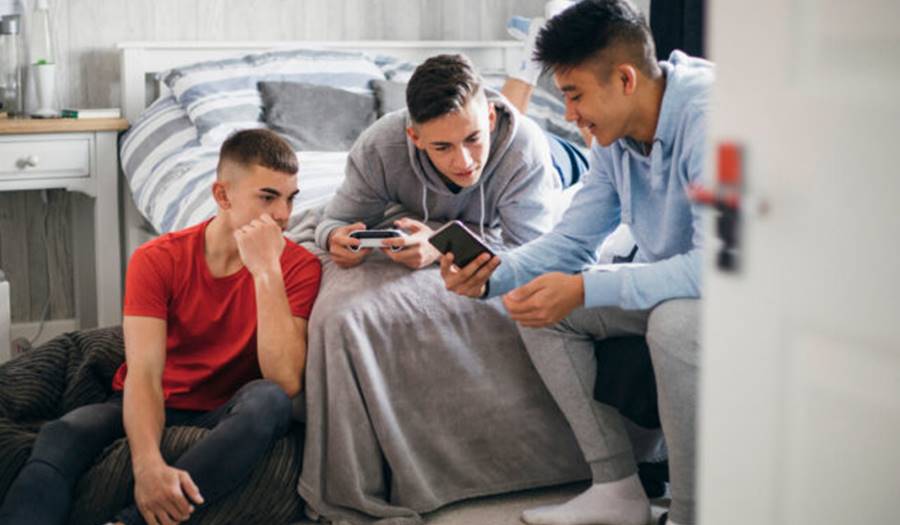
Screen Time
7/13/2020
Why we should be worried and how to reduce screen time
Screens, Screens, Everywhere
We can’t avoid screens. They are part of our world whether work, school, or for entertainment. But how much screen time is ok? Why should we be worried about screen time?
Screens are becoming more and more important in our society with brand new technologies coming out all the time. Who knew that we would all be walking around holding miniature computers? But screens are a big part of our life and they are here to stay. It is our jobs as parents and pediatricians to help your child navigate technology in a healthy manner.
Screen time is starting younger and hours increase the older your child is. By the time children reach the teen years they are averaging 7 hours of screen time NOT counting screens used for school or homework! Seven hours! That is a lot of screen time! In addition, 75% of teens use at least 1 social media site and 25% of teens say they are constantly connected to their phone.

But why are screens bad?
Screens cause eye issues, headaches, interfere with sleep, and increase your child’s chance of risk-taking behaviors and participation in cyberbullying. Excessive screen time can result in changes to your child’s’ brain. MRIs show a lower level of brain development in white matter with too much screen time. Your child’s brain is rapidly developing and doesn’t finish developing until they are 26 years old. Most of the development is taking place in the white matter during this time. Screen time results in changes in the white matter that control processing. These MRIs show slower processing in children with increased screen time.
Decreased language skills and decrease play are often seen in younger children. We also seen impaired executive function skills. Executive function skills include paying attention, being able organize, plan and prioritize information, starting tasks and staying focused on the completion of the task, and regulating emotions .Executive function skills also include the ability of hold information in your mind, to be able to think about something in different ways, to be able to stop and think before answering. All of these skills are essential to being successful in school.

How much screen time is recommended?
The American Academy of Pediatrics issued new recommendations last year for screen time:
Less than 18 months: no screen time (this does not include Facetiming family members)
18-24 months: Rare screen time, only high-quality programming, and it includes parent watching and talking with child during program
2-5 years: less than 1 hours/day, it is recommended parents watch with their child
5-18+ years: less than 2 hours of screen time (outside of school-related screen time)
Not all screen time is created equally. Engaging shows that stimulate discussion or learning have different benefits than video games or some social media. Context matters and content matters with screen time. What you consume during screen time and how you consume the information you get during screen time are just as important as how long you are on a screen.

What can I do as a parent to help reduce screen time or the effects of screen time?
It can be hard to set rules around screen time but the above shows the importance of limited screen time. As parents we can help REDUCE screen time. We recommend:
• Make a plan for screen time with your children. For example, some families do not allow screen time on school days except for schoolwork. But you need to determine what works for your family. Healthychildren.org has a great guide for making a plan.
• Set limits either verbally or using a screen time setting or application
• Eliminate any entertainment screen use during homework time
• Have media free family times
• Be a role model and attempt to reduce your screen time
What specific recommendations can you incorporate into your family screen time plan to reduce the effects of screen time? Here are a few things to consider
• No devices in bedrooms
• No screens 1 hour before bedtime
• Adding a blue light filter to devices
• Take frequent breaks for example with the 20/20/20 rule you should look at an object 20 feet away, every 20 minutes, for 20 seconds
• Take one 10 minute break every hour
• Correctly position the screen to reduce eye fatigue, for children this is having a screen just BELOW eye level
• Reduce screen brightness
How can you make these changes without a fight (or at least decreasing the chance of a fight)? We recommend:
• Have a plan and set an expectation for screen time before they start watching or playing on a screen
• Create a routine
• Avoid back to back shows (for example a Netflix show where one ends and the next one automatically starts)
• Give a 2 minute warning before shutting off or taking away screens
• Praise your child for cooperation
• Have another activity ready to go
• And most importantly: FOLLOW THROUGH WITH YOUR PLAN!
How about special occasions such as restaurants? Or the dinner table? We recommend NO screen times during meals. Again, the first step is setting an expectation that there will be no screen time. Bringing an activity or a family game that you can play while waiting can make the time pass more quickly.
Now, we can’t talk about screen time without discussing the current COVID-19 pandemic. This is a challenging time for all of us and we know everyone’s screen time has increased (us and our families included)! Do not feel guilty as this is an extraordinary time. Screens have become important for our children to maintain social connections with family and friends.

Screens are an important part of our life. But as parents we can work to make sure our children are experiencing screens in a positive, healthy way. We can set limits around screen time, increase the quality of content your child sees on a screen, and we can reduce the impact of screens on our bodies and minds.
Children’s Health Care of Newburyport, Massachusetts and Haverhill, Massachusetts is a pediatric healthcare practice providing care for families across the North Shore, Merrimack Valley, southern New Hampshire, and the Seacoast regions. The Children’s Health Care team includes pediatricians and pediatric nurse practitioners who provide comprehensive pediatric health care for children, including newborns, toddlers, school aged children, adolescents, and young adults. Our child-centered and family-focused approach covers preventative and urgent care, immunizations, and specialist referrals. Our services include an on-site pediatric nutritionist, special needs care coordinator, and social workers. We also have walk-in appointments available at all of our locations for acute sick visits. Please visit chcmass.com where you will find information about our pediatric doctors, nurse practitioners, as well as our hours and services.
Disclaimer: this health information is for educational purposes only. You, the reader, assume full responsibility for how you choose to use it.








